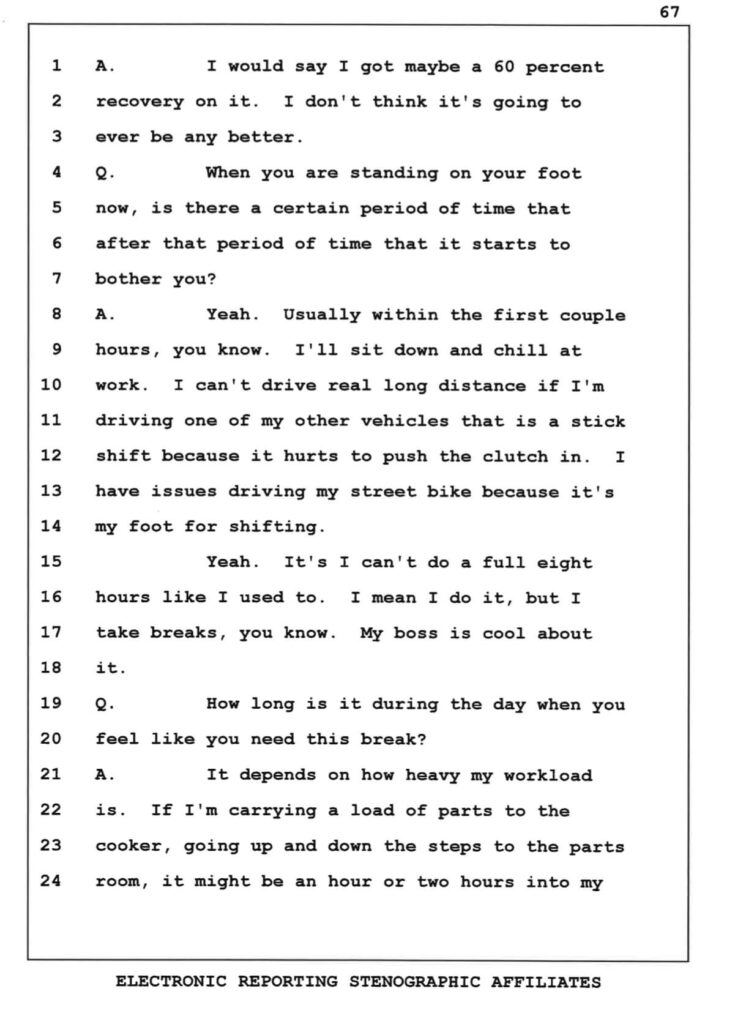A Deposition is part of the Discovery process in a lawsuit. Discovery occurs after a lawsuit is filed and served on the Defendant. The purpose of Discovery is for each side to find out information about the other side’s case. The side that filed the Lawsuit, the Plaintiff, finds out about the defenses that will be asserted and the Defense finds out about the Plaintiff’s claims. All evidence and witnesses get disclosed during Discovery so that there can be no surprises at Trial.
In a Personal Injury case, like a Car Accident, the Discovery process often leads to settlement of the lawsuit because the Defense learns everything about the claim and the Plaintiff learns everything about the defenses. This allows the lawyers to evaluate the likely result at trial and the what the risk would be of rolling the dice by taking the case to a verdict at Trial.
What is a Deposition?
A Deposition is a crucial part of the Discovery process when a Party, the Plaintiff or Defendant, or a witness is required to answer questions under oath and the questions and answers are transcribed by a court reported and typed into a transcript that is used by the lawyers for the remainder of the case.

In a Car Accident or other Personal Injury case, the Plaintiff will be asked many questions about various topics including: the accident, the Plaintiff’s injuries and medical treatment, the Plaintiff’s medical bills, lost wages and other expenses, the Plaintiff’s pain and suffering and disability, medical history, accident history, lawsuit history and background questions. A Plaintiff’s Deposition is taken by the Defense lawyer and usually lasts somewhere between one to four hours.
The Plaintiff will be answering questions, under oath, and will be committed to those answers for the remainder of the case.
Why is a Deposition So Important?
In a Personal Injury case the importance of the Deposition of the Plaintiff cannot be overstated. It’s a crucial event that can make or break the case.
I tell my clients that the Defense lawyer wants to take the Deposition for three reasons: (1) to find out information, (2) to lock the Plaintiff into answers under oath that cannot be contradicted at Trial without losing credibility and (3) perhaps most importantly, to meet and talk to the Plaintiff in order to evaluate his/her credibility and appeal to a Jury in the event that the case goes to Trial.
If the Plaintiff does well in the Deposition in terms of explaining the accident, injuries and impact as well as appears to be a credible and likeable witness, the case is much more likely to settle for a fair amount of compensation.
Because Depositions are such crucial events, in my Personal Injury practice I spend a significant amount of time with my clients preparing them for the Deposition and making sure that they are comfortable with the process and ready to succeed.
How to Prepare for the Plaintiff’s Personal Injury Deposition
The key to success in a Deposition is preparation and practice. Preparation involves having my client review the documents that are relevant to the case, like photographs, police reports, witness statements and medical records. Practice involves extensive role playing in which I pretend to be the Defense lawyer and ask my client the questions that he/she will face at the actual Deposition. I find that, after preparation and practice, my clients feel comfortable with the process and are ready for success at the real Deposition.

Tim Rayne is a Pennsylvania Car Accident and Personal Injury Lawyer with the law firm of MacElree Harvey. For over 20 years, Tim has been helping injured victims of accidents receive fair treatment from insurance companies. Tim has extensive experience settling cases with insurance companies and litigating cases to trial in Pennsylvania courts. For more information about Car Accident and Personal Injury topics contact Tim at 6108400124 or trayne@macelree.com.
